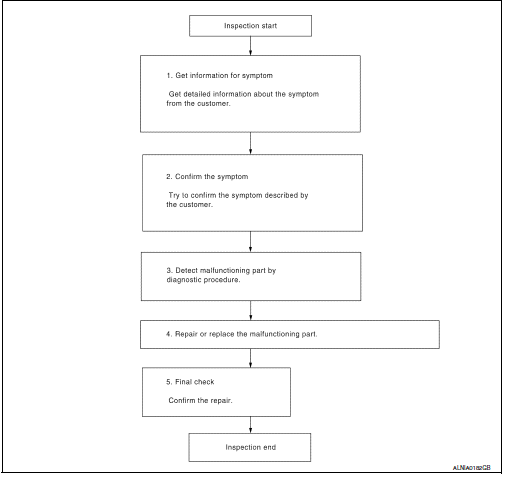Nissan Sentra Service Manual: Basic inspection
Diagnosis and repair workflow
Work Flow
Overall sequence

Detailed flow
1.Get information for symptom
Get detailed information from the customer about the symptom (the condition and the environment when the incident/malfunction occurred).
>> GO TO 2.
2.Confirm the symptom
Try to confirm the symptom described by the customer. Verify relation between the symptom and the condition when the symptom is detected.
>> Go to 3.
3.Detect malfunctioning part by diagnostic procedure
Inspect according to Diagnostic Procedure of the system.
Is malfunctioning part detected? YES >> GO TO 4.
NO >> GO TO 2.
4.Repair or replace the malfunctioning part
- Repair or replace the malfunctioning part.
- Reconnect parts or connectors disconnected during diagnostic procedure.
>> GO TO 5.
5.Final check
Refer to confirmed symptom in step 2, and make sure that the symptom is not detected.
Was the repair confirmed? Yes >> inspection end.
No >> go to 2.
 Wiring diagram
Wiring diagram
Display audio without bose
Wiring diagram
...
 Dtc/circuit diagnosis
Dtc/circuit diagnosis
Power supply and ground circuit
Audio unit
AUDIO UNIT : Diagnosis Procedure
Regarding wiring diagram information, refer to av-88, "wiring diagram".
1.Check fuse
Check that the following ...
Other materials:
P0743 Torque converter
DTC Logic
DTC DETECTION LOGIC
DTC
CONSULT screen terms
(Trouble diagnosis content)
DTC detection condition
Possible causes
P0743
TORQUE CONVERTER
(Torque Converter Clutch Circuit
Electrical)
The TCM torque converter clutch solenoid
valve current monitor ...
Engine protection control at low engine
oil pressure
ENGINE PROTECTION CONTROL AT LOW ENGINE OIL PRESSURE : System Description
SYSTEM DIAGRAM
INPUT/OUTPUT SIGNAL CHART
Sensor
Input signal to ECM
ECM function
Actuator
Engine oil pressure sensor
Engine oil pressure
Engine protection control
Oil pressure warning ...
P0014 EVT control
DTC Logic
DTC DETECTION LOGIC
NOTE:
If DTC P0014 is displayed with DTC P0078, first perform trouble
diagnosis for DTC P0078. Refer to
EC-183, "DTC Logic".
If DTC P0014 is displayed with P1078, first perform trouble diagnosis
for P1078. Refer to EC-359,
"DTC Logic&quo ...
